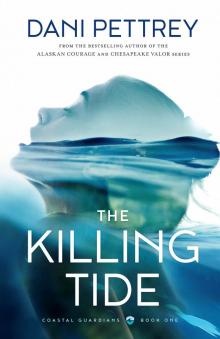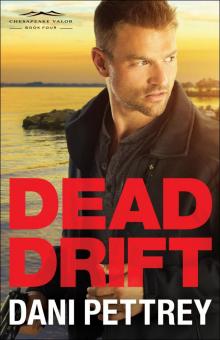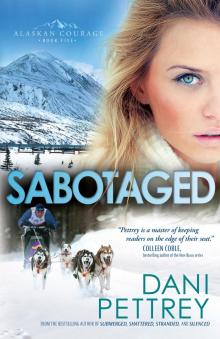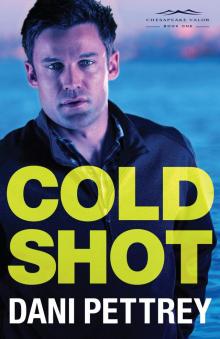- Home
- Dani Pettrey
Submerged Page 6
Submerged Read online
Page 6
Bailey swallowed. It hurt to hold Cole’s tender gaze. It was too kind. “Thanks. I really should . . .” Without finishing her sentence, she strode to Agnes’s casket and remained still until she heard their footsteps fade. Only then did she allow the tears to fall.
9
Piper squeezed Cole’s arm. “She seemed so sad.”
“I’m sure she is, kid.”
He glanced over his shoulder at Bailey standing beside the casket, her back to him—her shoulders finally slack.
She’d remained so stiff during the service—a blank expression on her face, her jaw rigid.
His heart went out to her. For all she was going through and all she’d been through.
She’d always put on a brave front, pretending the crude nickname and teasing gossip didn’t hurt her. Maybe it hadn’t, but he doubted it.
She couldn’t help but feel something at being used by the boys and teased by the girls. Never having any true friends, no real love outside of Agnes. Maybe he should have been kinder. Tried harder. Shown some mercy and forgiveness. But he’d been hurt too. He’d loved her once, and she’d stomped on his heart without any remorse.
But . . .
He sighed.
If he’d been a true friend, he would have tried yanking her back from the slippery slope she was hurtling down, instead of standing by and watching her self-destruct.
Was it too late to make amends? Too late to part on better terms?
She turned, her tear-filled eyes meeting his, and his breath hitched.
She wiped her face, turned heel, and strode away.
Tom and Thoreau were right about one thing. Bailey was still gorgeous, though in a softer, more natural way. Gone was the heavy black eyeliner, the deep red lipstick. Instead, a soft rose blushed her cheeks and supple lips. The only adornment to her striking blue eyes was her long silky lashes that fluttered when she blinked.
She was so much more beautiful now.
“Cole,” Slidell hollered from across the street.
He waved, signaling he’d heard him, then turned to Piper, who remained at his side. “I better see what he wants.”
Piper nodded. “Okay, I’ll catch up with you later.”
He planted a kiss on the top of her head. “Thanks for coming today.”
“You bet.” With a quick wave to Slidell, she headed to her Jeep.
With a sigh, Cole crossed the street, avoiding the flood of tourists plowing up the hill en route to the shops of Main Street. Like a flock clinging to their shepherd, they clumped together, struggling to stay close to their tour guide, the panic on their faces evidence of their fear—fear of missing some factoid of history, a clever anecdote, a shop suggestion. If they didn’t slow down, they’d totally miss the beauty Tariuk had to offer—the rugged mountain peaks still laced with snow, the fresh sea air, the colorful shops and people that called Yancey home.
“I hate tourist season.” Slidell banked his gum wrapper off the trash can.
“I thought you were on board with the mayor’s plan to build a dock on the west shore large enough for cruise ships so the tourists didn’t have to be shuttled over by smaller boats.”
Slidell folded a fresh piece of gum in his mouth. “Don’t get me wrong. What’s good for Yancey’s economy is good for Yancey, so I’m all for it. But it doesn’t mean I like the throng of outsiders stampeding through my streets four months out of the year.”
“Always the politician.”
“Hey, mine is an elected position. I have to do what’s right by the people.”
Cole still wondered how his neighbors had voted for Slidell in the first place, but the fact was they were stuck with him for another year. It wasn’t that Slidell was a bad man; he simply cared more for his image than for seeing justice done.
“Booth called.”
“Okay?” Cole slid his hands in his trouser pockets.
“He’s finished the girl’s autopsy and found something he wants you to see.”
His heart lurched. Had a problem been discovered with the equipment? He prayed not.
Slidell lifted his chin. “Shall we?”
Cole nodded and followed Slidell the three blocks down and two blocks over to the morgue.
Landon and a very impatient-looking Mayor Cox met them out front of the two-story brick building that sat adjacent to the north side of the sheriff’s station.
Cox held up his fist, a crumpled wad of paper seized inside. “What is the meaning of this?”
“Care to elaborate, Neil?” Slidell asked.
Cox unclenched his fingers, smoothing out the flyer the best he could. “How could you paste this girl’s face all over town?”
“Not hard,” Landon replied. “Deputy Earl Hansen made up the flyer at the station. Armed with a box of them and a staple gun, it took me less than an hour.”
Cox tapped his foot in a rapid, caffeine-fueled pace. “Less than an hour to scare off our livelihood.”
“I beg your pardon?” Landon narrowed his gaze. “Are you suggesting we should impede the investigation of a woman’s death so that we don’t scare off the tourists?”
“Not impede—simply . . .”
Landon’s jaw tightened. “Simply, what?”
Cox’s agitated gaze shifted to Slidell. “What are you trying to accomplish with these flyers?”
“We’re trying to get a lead on the woman’s identity.”
“Isn’t there a more subtle way to accomplish that? Questioning our townsfolk rather than frightening our tourists?”
“We are working our way through the community,” Landon said. “So far—other than Piper and Jake—no one remembers seeing her.”
“Fine. Continue with your investigation, but would it kill you to be discreet?”
Color crept up Landon’s neck. “A woman’s dead.”
“I understand that, and while it’s very unfortunate, there is no need to go scaring the tourists.”
Irritation at the mayor’s lack of concern and lack of decency bit at Cole. “A person dies and you’re worried about image?”
“I’m worried about the people of this island. A lot of folks’ livelihood hinges on tourist season.”
“Last Frontier Adventures included,” Cole said. “But some things are more important.” Like justice.
“All I’m asking for is a little consideration for our shopkeepers.”
“We’ll take that into account, Mayor,” Slidell said in a conciliatory tone.
Cole looked at Landon. They both knew what that meant. Slidell would cave to Cox’s wishes. He always did. But that didn’t mean a concerned citizen couldn’t keep flyers posted in his shop window.
“If we’re done here . . .” Slidell glanced at his watch. “We’ve got an appointment with Booth, and we’re late.”
Cox straightened his tie. “Of course.”
“You’re welcome to come along,” Landon said. “Maybe you’d feel something for the woman if you saw her.”
“I don’t think that’s necessary.” Cox took a step back. “I’ll leave you gentlemen to your business while I attend to mine.” He turned heel and scuttled away.
Landon shook his head. “He’s got some nerve.”
Cole followed Landon and Slidell into the morgue, the building temperature a solid twenty degrees colder than the outside air.
Nancy Bowen sat behind the front desk. With the receiver wedged between her right shoulder and head, her hands were free for touching up her nail polish. Deep red.
She caught sight of Landon and her cheeks flushed. “I gotta call you back,” she muttered into the phone before resting it in the cradle. “How can I help you boys?”
“Booth called,” Slidell said, straight to the point.
“You can go on back.”
She stood as Landon filed past. “Good to see you again, Landon.”
“Nice to see you too.”
Her smile spread.
Cole leaned over once they were out of earshot. “Miss Matchmake
r will be pleased.”
Landon’s lips thinned. “Don’t you dare say anything to encourage her. I’m ready to strangle Piper as it is.”
“Gentlemen,” Booth said as they entered the windowless room.
The odor of flesh and death clung to the white tile walls and floor. A soiled lab coat hung on a hook beside the large stainless-steel sink.
“Cole, I’m glad you came along.” Booth slipped on a fresh pair of gloves. “There’s something I want you to see.” He moved to the body on the exam table and lifted the sheet draped over it.
Liz Johnson lay with eyes closed. Her chest was stitched up, her skin gray beneath the fluorescent lighting and marred with black splotches.
Not long ago she’d been alive—laughing, smiling, with no clue she’d soon be lying on a cold stainless-steel table, being observed by strangers as a piece of evidence. A shiver snaked up Cole’s spine.
Booth lifted the woman’s hand and adjusted the light to fall on it. “I wanted your opinion on what I found under several of her nails.”
Cole narrowed his gaze, focusing on the reddish-brown substance imbedded under her nail. “Looks like calcite.”
“Mmm-hmm.” Booth nodded.
“What exactly is calcite?” Sheriff Slidell asked, irritation lacing his voice. Booth deferred to Cole.
“It’s a mineral found in caves. Sheets of it grow on the floors and walls. They’re called flowstones.”
Slidell hitched up his pants. “Is that right?”
Booth nodded. “Owen Matthews made the trip down here from Kodiak.” His gaze shifted to Cole. “Good recommendation, by the way.”
“I’m glad.” Cole swallowed, almost afraid to ask. “Did he find anything?”
“Actually, yes, he found recent surface damage on her air tanks that is consistent with maneuvering through the tight constraints of underwater caves.” He moved to the tanks that rested on a nearby table and pointed to the area.
“Any other problems with the equipment?” Slidell asked.
Cole squeezed his fists, fear niggling at him.
A crooked smile broke on Booth’s craggy face. “Matthews’s findings were that there was absolutely nothing wrong with the equipment.”
An enormous wave of relief washed over Cole. “You’re certain?”
“Positive. Matthews said the equipment was in perfect condition, other than the damage he suspects occurred while the victim was squeezing through some tight cave passageways.”
“Victim?” Landon said.
Booth nodded, moving back to the body.
“You’re certain?” Slidell asked.
“Quite. Cause of death was suffocation.”
Slidell frowned. “Was there a problem with her air supply?”
“No. She suffocated as a result of a crushed trachea. I found bruises on her neck consistent with someone grabbing her from behind, as well as defensive wounds on her hands and forearms.”
“She fought her attacker,” Landon said.
Booth nodded, grimly. “She didn’t die quick. Bruises on her shoulders indicate someone held her down.”
“So someone grabbed her from behind like this”—Landon used Cole for demonstration purposes, wrapping his fingers tight around Cole’s neck—“crushed her trachea as she struggled, then”—he moved his hands to Cole’s shoulders—“held her down until she suffocated?”
“I’m afraid so.”
Slidell’s jaw tightened. “So we’re dealing with murder?”
Booth nodded. “Yes, sir, we are.”
10
Bailey slipped her jacket over the chair back, her heart still hammering in her throat.
Cole McKenna. The one person she’d longed to avoid, yet ached to see.
Her hands trembled, and she put them to use unwinding her hair. She flung the bobby pins into a mishmash on the desk and stared at them, refusing to close her eyes for fear of picturing Cole, his powerful gaze searing through her.
While his eyes held no condemnation, nothing to fill her with shame, she was brimming over with it—the insatiable inner anguish that said she didn’t belong, that she wasn’t enough.
Butterscotch leapt on her lap, and she nuzzled him close.
Too many memories lingered in this place, too much pain—raw and on the surface.
Time to put Cole and Yancey behind her for good . . . time to stop wondering what might have been.
Placing the cat in his favorite spot—the right corner of the window display—so he could sun himself, Bailey moved into the kitchen and put on a kettle of tea. She had a long day of work cut out for her; she might as well arm herself with nourishment.
A plate of oatmeal cookies in one hand, a steaming mug of lavender tea in the other, she approached the overwhelming mess in front of her with optimism. The sooner it was done, the sooner she could leave Yancey once and for all.
Starting with the nearest pile, she dove into the arduous task of organizing Agnes’s files.
Halfway through the first stack, a knock rapped on the door.
She glanced up, half praying it wasn’t Cole and half praying it was.
An elderly man cupped his hands to the glass and peered in. When he spotted her, he smiled.
No doubt a tourist, they flooded the town today.
She rose and unlocked the door. “I’m sorry, we’re . . .”
The man was tall, with a robust midsection. His weight was braced against a gnarled wooden cane, his labored breaths coming in uneven bouts.
“Are you all right?”
He nodded, though taking a moment to compose himself. “That’s a—” he took another wheezy breath—“long walk up here.” His thinning brown hair was heavily interspersed with gray, his beard and moustache completely silver. He coughed, then managed a weak smile. “I forget I’m not getting any younger.”
“Please. Why don’t you come in?”
She helped him inside and into a chair.
Perspiration clung to his forehead. Pulling a handkerchief from his trousers, he dabbed his face.
He wore a casual dress shirt, white with blue pinstripes, sleeves clasped with a pair of gold cufflinks, and a blue sweater-vest.
His gaze swept across the shop.
The afternoon sun streaming in the front windows lit and warmed the room. Bailey glanced at the clock beside her empty mug and realized she’d been working nearly two hours. She stared at the meager dent she’d managed to make and groaned.
“Looks like you have quite the project going.”
“I’m trying to get things in order.”
“I see.” He hoisted himself out of the chair, his weight readily fixed on the cane. “Well, I shan’t keep you long. I am in the market for a tea glass holder.” His gaze wandered to the display case. “I see you have several. Perhaps you can help me choose one. It’s for my Nessie.”
“Your wife?”
“Aye, going on fifty-four years.”
“Congratulations.”
“Nessie would have been here herself, but she fell and broke her hip last winter, and she’s not much for walking since. I told her I’d scurry up here and get her a holder, not to worry.”
“Oh.” Bailey bit her bottom lip.
“Something the matter?”
“It’s just . . . I’m not actually open.”
Confusion flitted across his face. “Not open?”
“I’m getting the place ready for sale.”
“Sale?” His hand shook and the cane with it. “She’s selling the Trading Post?”
“She?” Bailey moved closer to steady him.
He sank back onto the chair. “The dear lady who owns this place.”
Bailey swallowed, the words still hard to manage. “Agnes, the owner,” she clarified, “she passed away.”
“Oh dear.” His coloring paled.
“Did you know her?”
“Not well, of course. But Nessie and I have been taking this cruise every August for the last decade. The Trading Post is always o
ur first stop. Nessie and Agnes . . .” He inclined his head to make sure he’d got the name right and Bailey indicated he had. He continued. “The two of them would get talking, and nine times out of ten, the Trading Post was the only stop we were able to make before our ship headed out again.” He exhaled with a wheeze. “Poor Nessie’s going to be so disappointed. And Agnes . . .” He shook his head in dismay. “Was it cancer? It’s always cancer nowadays.” He spoke with the anguish of a man who’d lost a loved one to the dreaded disease.
“It was an accident.” Bailey cleared the lump in her throat. “A plane crash.”
“Oh my. I don’t care what they say. A ton of metal is not meant to be airborne. That’s why Nessie and I only travel by ship, car, or train.”
Bailey wrapped her arms around her waist. “Can’t say I blame you.” As eager as she was to leave Yancey, she wasn’t looking forward to the flight.
“Now you’re selling the place.” He looked around and shook his head. “Another shame.”
“I am only selling to someone who will keep it the Trading Post.” She felt the need to explain.
“I’m sure Agnes would have appreciated that.” His eyes narrowed, and he studied her a bit more carefully. “If you’re selling the place . . . were you related to her?”
“She is—” Bailey caught herself—“was . . . my aunt.”
“Aunt Agnes.” He seemed to like the ring of that. “I bet she was a wonderful aunt.”
“The best.” Bailey withstood the prick of tears.
The man clutched his cane and grappled to his feet, unsteady enough to make Bailey nervous. He smiled at her, his expression soft and warm. “Well, I’ve taken enough of your time, my dear. Nessie will understand.” He hobbled toward the door.
“Wait.” What would it hurt to make one sale?
He paused, a brow arched.
“I’m sure we can handle a sale on our own. I worked here all through high school.”
“I don’t want to be any trouble. . . .”
“It’s no trouble at all.”
The man’s face lit.
Bailey watched the elderly gentleman cross Main Street. Safely on the other side, he turned and waved.
She returned the gesture and watched until he hobbled out of sight, feeling good she’d been able to help him. She felt confident his wife would love the tea glass holder. It was the best Agnes had in stock—silver, dating to the mid-nineteenth century, the detailing exquisite.

 Shadowed
Shadowed The Killing Tide
The Killing Tide Submerged
Submerged The Crushing Depths
The Crushing Depths Silenced (Alaskan Courage Book #4)
Silenced (Alaskan Courage Book #4) Dead Drift
Dead Drift Stranded
Stranded Still Life
Still Life Blind Spot
Blind Spot Sabotaged
Sabotaged Shattered
Shattered Cold Shot
Cold Shot